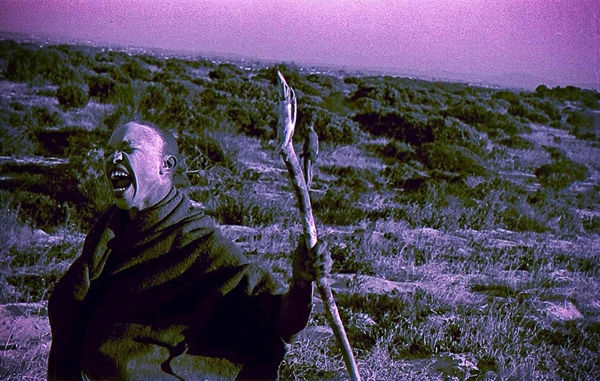Urban initiates: are the teachings still relevant?

In many African cultures, boys from age 14 must go through the process of initiation, where they are circumcised in order to be recognized as men by the community. But how relevant is the ceremony for today’s urban youth and are the traditions being upheld in the cities?
Boys are taken “to the mountain” for a period of time and are taught how to behave as men in society, to take responsibility and ownership of their lives.
Initiates are referred to as abakwetha in groups or umkhwetha as individuals.
In cities, most boys go to a forest or field where they can build a bhoma (initiation hut), but they still refer to it as going to the mountain.

Abakwetha singing during the last day of initiation. Photo by Masixole Feni.
The boys have to stay until the body heals from the circumcision and they feel strong enough to face the world. In the Sotho culture, young boys spend two months or more; in Xhosa culture, small groups or individuals stay for three to five weeks.
Bongani Bonco, who went to the mountain in the Eastern Cape eight years ago, says that many years ago young boys took their manhood seriously. He says that the youth of today do not follow the teachings of their elders.
“I went to the mountain when I was 16 years old. I was taught how to be a man and take responsibility. Today, I go back to the mountain occasionally to teach young boys how to be men, and give them the same teachings given to me,” says Bonco.
Dumi, who went to the mountain three years ago when he was 18 in Gugulethu, says that life in the mountain is hard. They are given different teachings and it’s up to a person whether or not he takes the advice and teachings from the elders.
Some mothers in the townships are concerned about the teachings that the boys get when they are away; they complain that the men come back arrogant and with bad manners.
Nonceba, Dumi’s mother, claims that before he went to the mountain he was a good boy; he did not bother anyone and he did not participate in any crime.
“Weeks after Dumi came from the initiation, he started smoking and got strange friends. He goes missing for days and comes back with money, saying he is a man and has to take care of his family. He doesn’t want me to question his ways because he is a man he says.”
“It hurts because I lost my boy who used to be humble to a man that drinks and behaves in a manner that he was not taught when he was growing up,” says Sondoloze.

Abakwetha sitting outside their Ibhoma. Photo by Masixole Feni.
One young man who was recently initiated in the Sotho culture says that people shouldn’t blame the teachings of the elders at the mountain.
“When we go there we go in groups and we are all given the same lectures, but it’s a person’s choice on how to respond to it.
“For instance, most of the time, we as man we sit together and we get to know each other. Most of us are unemployed and are struggling financially and yet we are taught to be a man and take responsibility. Those are pressures on their own.
“So we discuss ways of survival because as men it’s going to be embarrassing to ask our parents for money. So we connect and get solutions and unfortunately those solutions in most cases relate to crime activities. So it’s not the knowledge that we get from the elders, but it’s the information we get from our peers,” says the young man.

Umkwetha sitting outside his bhoma. Photo by Masixole Feni.
But Sinesipho Majobela says that he doesn’t see the point of going to the mountain; it’s torture. He says that the teachings that young boys get at the mountain can be given by their family members.
“I do not see the fuss. Yes, its culture, but is it worth it if the same culture gives you diseases, deaths and makes you become a different person who is disobedient to elders?”
“I prefer going through the medical circumcision; it’s cheaper, healthier and also there is no physical torture. If I have to slaughter a goat at my home to embrace it then I will do so.”
Tsepo Modise, who hasn’t been to the mountain, says that we should respect culture and do what the elders teach. “Yes, I agree, people especially in the westernized lifestyle they do not understand the fuss over initiation … it does not fit within the [city] lifestyle.”
He believes that those who go through the circumcision in the cities behave differently from those who go to rural areas for the ceremony, where the old values are still taught.
Support independent journalism
Donate using Payfast

Don't miss out on the latest news
We respect your privacy, and promise we won't spam you.
Next: Zimbabweans can now stay longer for the festive season
Previous: Massive implications of Cosatu crisis and other stories

This article is licensed under a Creative Commons Attribution-NoDerivatives 4.0 International License.
